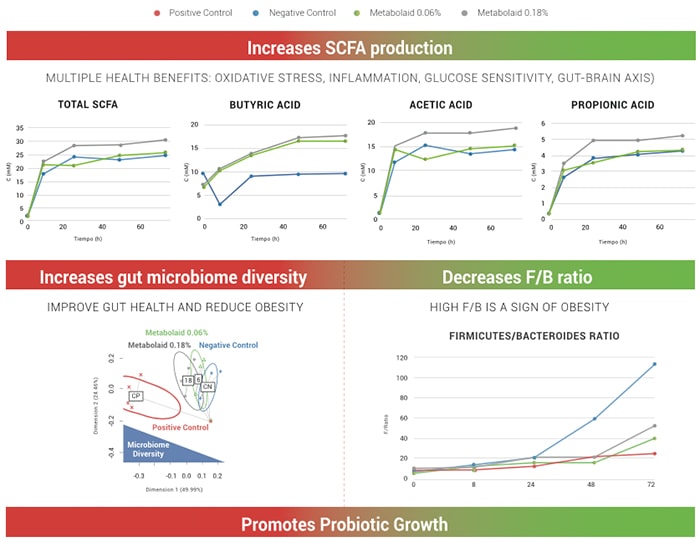The gut microbiome is known to play a vital role in many aspects of our health; from nutrient absorption to immune function, weight management, and even mental health. The gut microbiome is comprised of numerous bacterial populations, each with different roles, and is maintained in a delicate, complex balance. When there´s an imbalance, called dysbiosis, this can give rise to inflammation, diabetes, excess body weight, accelerated ageing, or even increased risk of cancer and dementia. Therefore, it is critical to maintain a balanced, healthy population of bacteria in our gut to avoid these conditions.
There are several possibilities to improve the gut microbiome. These include probiotics (introduction of healthy bacteria), prebiotics (substances that feed and support innate healthy bacteria and/or reduce hazardous populations), synbiotics (combination of pre-and probiotics), and postbiotics (inactivated microorganisms and/or their components). Each have their own specific benefits, and there is a growing number of possibilities in the market, making it difficult for consumers to know what´s the right choice for them.
Recently, researchers have been elucidating on how dietary polyphenols can help modulate the gut microbiota, with numerous benefits at a systemic level. The gut bacteria degrade the polyphenols into active, biodegradable metabolites, and in turn the polyphenols contribute to maintaining a healthy bacterial population. This has been shown to confer numerous health benefits, therefore, plant-derived supplements rich in polyphenols can be a potential candidate for gut-healthy solutions.
However, not all polyphenols are equally effective, and different polyphenols can have different effects on gut microbiome modulation. Therefore, as the gut microbiome has important implications in weight management, we decided to analyze our branded ingredient Metabolaid to elucidate its potential relationship with the intestinal bacteria. Metabolaid is a blend comprised of lemon verbena and hibiscus extracts that has been extensively studied in several clinical trials as well as in preclinical studies to demonstrate its effects on weight management, cardiovascular health, lipidic profile, and satiety. As the gut microbiome is implicated in many of these processes, we decided to discern if the polyphenols present in Metabolaid could play a role in modulating the relevant bacteria.
A dynamic gastrointestinal simulation model was used in order to assess the effects of Metabolaid on the human gut microbiome. This innovative model imitates the human digestive system, and allows to discern the interactions and mechanisms that occur in the different intestinal compartments in a more detailed manner than analyzing human fecal samples in a clinical study. In this model, stool samples from healthy donors were used in the different colonic compartments, to assess the effect of Metabolaid in the gut microbiome for up to 72 hours after inoculation. The results were compared to a negative control and compared to a prebiotic (Raftilose) as positive control.
One of the results observed with Metabolaid was that its presence increased microbiome diversity. Microbiome diversity is a marker of good gut health, and it has been shown that in obesity and other metabolic disorders the diversity is low. The study indicated that Metabolaid, in a dose-dependent manner, increased gut diversity particularly in certain beneficial bacteria such as Bifidobacterium and Faecalibacterium, which are well-known bacteria that are implicated in maintaining a healthy gut. In fact, Bifidobacterium is commonly used as a probiotic for gut health. These healthy bacteria in turn produce short-chain fatty acids (SCFAs), which are the by-products released as a consequence of the digestion of fibers and oligosaccharides. SCFAs production is crucial for gut health, as they serve as feed for intestinal cells and are involved in numerous processes (reduce inflammation, control appetite, regulate absorption of nutrients, cardiometabolic health, etc). The study showed that Metabolaid contributed to increasing SCFA production, with a particular increase in butyric acid. Butyric acid is known to increase AMPK activation, which has also been observed with Metabolaid. This AMPK activation in the intestinal tract contributes to gut health, and has also been shown to increase the satiety hormone GLP-1. Therefore, the satiety-enhancing effects observed in previous studies with Metabolaid could also be partially explained due to its interaction with the gut microbiome.

Another assessment performed was with regard to the Firmicutes/Bacteroidetes ratio (F/B). Firmicutes and Bacteroidetes are two major bacterial phyla present in the gut, and in obesity this ratio is high. The results showed that Metabolaid contributed to decreasing the F/B ratio, particularly at 48 and 72 hours after consumption. Therefore, Metabolaid´s weight management effects could be attributed not only due to its direct interaction with target organs such as the fat, liver and muscles, but also indirectly through gut microbiome modulation towards a population more similar to that found in healthy weight individuals.
Regarding specific bacterial populations, besides the populations mentioned previously, there was a significant increase observed in other bacteria of interest, especially those involved in weight management. For example, increased levels of Blautia, Prevotella and Akkermansia were detected. Low levels of these three bacterial populations are associated with obesity, inflammation, and insulin resistance, and certain researchers suggest that increasing these populations, through diet or supplementation, could help prevent or reduce obesity. Therefore, Metabolaid increasing these bacterial populations could be another possible mechanism that the ingredient contributes to weight management.
Therefore, the study suggests that Metabolaid´s benefits may be not only due to its direct interaction with the fat tissue and other body compartments, but also in part to its interaction with the gut microbiome. Previous studies have shown that the active components present in Metabolaid, anthocyanins and phenylpropanoids, are capable of reaching the colon relatively intact, and therefore exert its effect where the gut bacteria are more abundant. This new study opens up a new potential pathway of action that Metabolaid presents, with implications in weight management, appetite control and cardiovascular health.
Click here to DOWNLOAD the full study.
Chief Scientific Officer at Monteloeder S.L.


